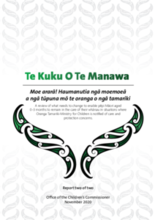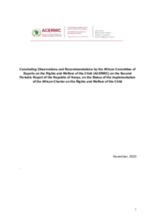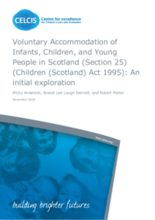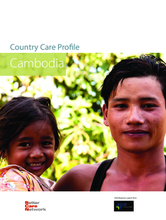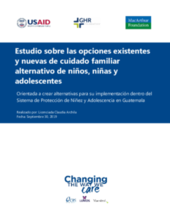Displaying 161 - 170 of 1787
This webinar was part of Eurochild’s breakfast webinars to mark World Children’s Day 2020. This webinar looked at the intersection between children’s rights and democracy.
The Children’s Commissioner of New Zealand undertook a thematic review of the policies, processes and practices of Oranga Tamariki Ministry for Children relating to care and protection issues for pēpi Māori (Māori infants) aged 0-3 months. This second report comes to the clear conclusion that to keep pēpi in the care of their whānau, Māori must be recognised as best placed to care for their own.
This document lays out the concluding observations and recommendations developed and adopted by the African Committee of Experts on the Rights and Welfare of the Child (ACERWC/the Committee), which considered the second periodic report of the Republic of Kenya during its 35th Ordinary Session.
This report presents findings in relation to the purpose, frequency, and variation in the use of Section 25 orders in Scotland, which enable parents, supported by social workers, to voluntarily place their child to secure their safety, into the care of a local authority away from the parental home.
The purpose of this research was to examine the overlap between the Youth Justice (YJ) and the Child Protection (CP) systems in Australia, and profile selected characteristics of children and young people who have YJ and CP system involvement.
This paper draws upon findings from a study which followed families through the process of pre-birth child protection assessment. It is argued that it is necessary to engage critically with the ‘first three years’ narrative that has become dominant in Scottish policy making and the impact this has had on child protection practice and the lives of families. The paper argues for a broader interpretation of ACEs focused on community and public health across the life course.
This country care profile provides an overview of key lessons learned in the children’s care reform process in Cambodia, including successes, challenges and areas for progress, and gaps in learning and best practice.
No reconocimiento de Kafala constituida entre ciudadanos marroquíes a efectos de adopción. Antecedentes y alcance de la prohibición contenida en el artículo 19.4 de la Ley de adopción internacional.
This Russian language Compendium documents UNICEF’s social policy interventions in Europe and Central Asia from 2014-2020 and includes 18 case studies from 15 different countries as well as stories from the field.
Este informe de Changing the Way We Care revisa las opciones existentes de cuidado familiar alternativo en Guatemala y ofrece recomendaciones para otras modalidades y prácticas.

